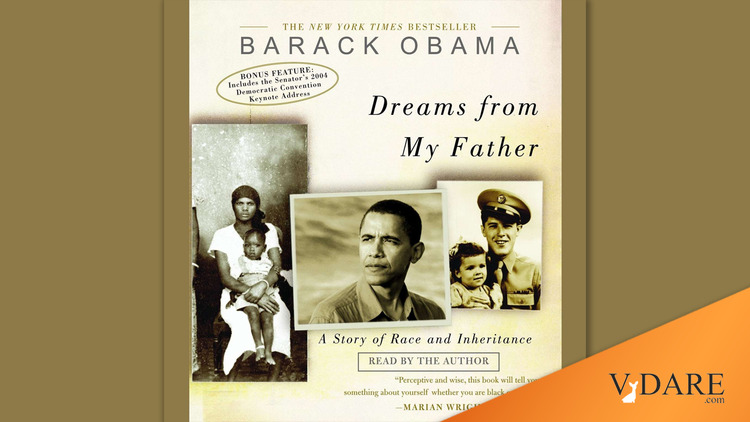
Obama Confessed To Racially Profiling Black Youths In His Autobiography — Just Like Richard Cohen
By Steve Sailer
07/17/2013
Richard Cohen writes in his Washington Post column:
In the meantime, the least we can do is talk honestly about the problem. It does no one any good to merely cite the number of stop-and-frisks involving black males without citing the murder statistics as well. Citing the former and not the latter is an Orwellian exercise in political correctness. It not only censors half of the story but also suggests that racism is the sole reason for the policy. This mindlessness, like racism itself, is repugnant.
Crime where it intersects with race is given the silent treatment. Everything else is discussed — and if it isn’t, there’s a Dr. Phil or an Oprah saying that it should be. Crime, though, is different. It is, like sex in the Victorian era (or the 1950s), an unmentionable but unmistakable part of life. We all know about it and take appropriate precaution but keep our mouths shut.
At one time, I thought Barack Obama would bring the problem into the open and remove the racist stigma. Instead, he perpetuated it. In his acclaimed Philadelphia speech on race, he cited his grandmother as “a woman who once confessed her fear of black men who passed her by on the street.”
How about the former Barry Obama? When he was a Columbia University student living on the lip of then-dangerous Harlem, did he never have the same fear?
Indeed, as I pointed out in March 2008, following the famous Philadelphia "race speech," the Presidential frontrunner’s bestseller Dreams from My Father: A Story of Race and Inheritance includes a passage in a Chicago chapter in which he obliquely confesses to racially profiling black youths:
"That night, well past midnight, a car pulls up in front of my apartment building, carrying a troop of teenage boys and a set of stereo speakers so loud that the floor of my apartment begins to shake. I've learned to ignore such disturbances — where else do they have to go? I say to myself. But on this particular evening I have someone staying over …
"'Listen, people, are trying to sleep around here. Why don’t y'all take it someplace else?'
"The four boys inside say nothing, don’t even move. The wind wipes away my drowsiness, and I feel suddenly exposed, standing in a pair of shorts on the sidewalk in the middle of the night … . One of them could be Kyle. One of them could be Roy. One of them could be Johnnie."
Kyle, Roy, and Johnnie are all black male characters in Dreams from My Father — in other words, as Obama’s grandfather might say, the fellas in the car are black. Obama then proceeds to make stereotypical assumptions about young black males' violent tendencies:
"I start picturing myself through the eyes of these boys, a figure of random authority, and know the calculations they might now be making, that if one of them can’t take me out, the four of them certainly can."
The chapter ends:
"The engine starts, and the car screeches away. I turn back toward my apartment knowing that I've been both stupid and lucky, knowing that I am afraid after all."
Shocking, isn’t it?
Let me quote one sentence to show you why so few people ever finish reading Dreams from My Father:
"As I stand there, I find myself thinking that somewhere down the line both guilt and empathy speak to our own buried sense that an order of some sort is required, not the social order that exists, necessarily, but something more fundamental and more demanding; a sense, further, that one has a stake in this order, a wish that, no matter how fluid this order sometimes appears, it will not drain out of the universe."
I think this means that the Ivy Leaguer has just now realized he’s on the side of the cops, not on the side of the crooks.
But, of course, unlike his grandmother, Obama is allowed to racially profile blacks.
Because he’s black.
Have you noticed how 21st Century ethics are just becoming simpler and simpler?
